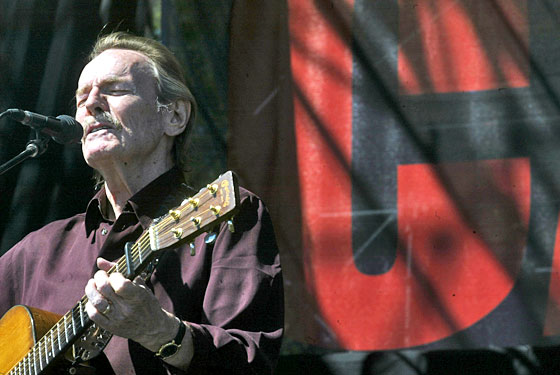
Gordon Lightfoot is not dead! Never mind this week’s obituary on the website of Canada’s National Post, or the many tweets spreading the news thereafter. He’s fine — “I feel fine” was the quote he gave a Toronto TV-news reporter. He’s just the latest to join the “I Saw My Own Obituary Society.” (It’s sort of a companion group to the Eclipsed Celebrity Death Club.)
It’s a surprisingly big club, even aside from Mark “Reports of My Death Have Been Greatly Exaggerated” Twain. Bob Hope and Fidel Castro. Steve Jobs and Joe DiMaggio. Alfred Nobel and Marcus Garvey (who is said to have collapsed and died when he read his own obit). A couple of popes, too. And, of course, there’s Abe Vigoda. The co-star of The Godfather and Barney Miller was erroneously killed off by People magazine in 1982, and his quasi-death is practically a comedy meme. To this day, you can check in anytime at abevigoda.com, which has only one function: indicating whether Abe is dead or alive. As of a few minutes ago, he was still ticking, at 88.
Most false obits are caused by a simple screwup: As media people know (but many readers do not), major obituaries are pre-written, to hedge against a deadline crisis. That’s how the New York Times could plop a multi-thousand-word eulogy for J.D. Salinger onto its website an hour after the writer’s death became public. And once in a while, someone accidentally releases a story ahead of schedule. This especially tends to happen on the web. (Also, did anyone besides us spot the sentence “Quote TK from Salinger’s agent about surviving manuscripts” in the first few minutes after the Times posted its story?)
Like most false obituaries, Abe Vigoda’s was an honest mistake. Gordon Lightfoot’s, by contrast, appears at this early stage to have been an ugly prank, and hoaxes along those lines have nearly become a Twitter staple. Natalie Portman and Jeff Goldblum both got counterfactually offed this summer. Neither rumor stuck, because death hoaxes are most effective when one’s response is “I didn’t know he’s still alive.” Gordon Lightfoot is a celebrity in Canada, but most Americans haven’t heard from him since the Edmund Fitzgerald sank, a million times over, on top 40 radio in 1976.
Twitter and other fast-moving media make these hoaxes far easier to execute — but, neatly, they also make them far easier to undo. In 1982, hundreds of thousands of readers saw that People article about Abe Vigoda; barely a few hundred probably read the correction the next week. By contrast, a corrective tweet carries nearly as much weight as its flawed predecessor. The imprecise, semi-disposable aspect of web news becomes its saving grace: The cloud of collective intelligence is quick to heal itself, spreading the word: I feel fine. Glad to hear it, Gordon.





